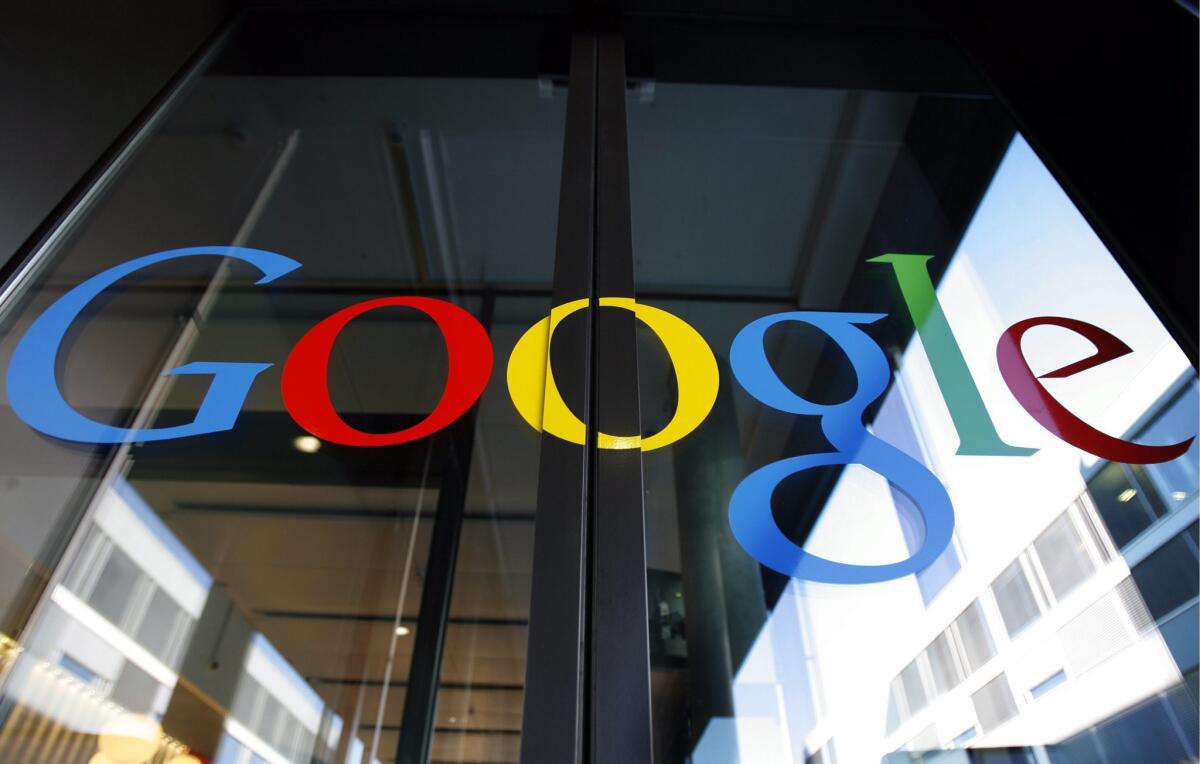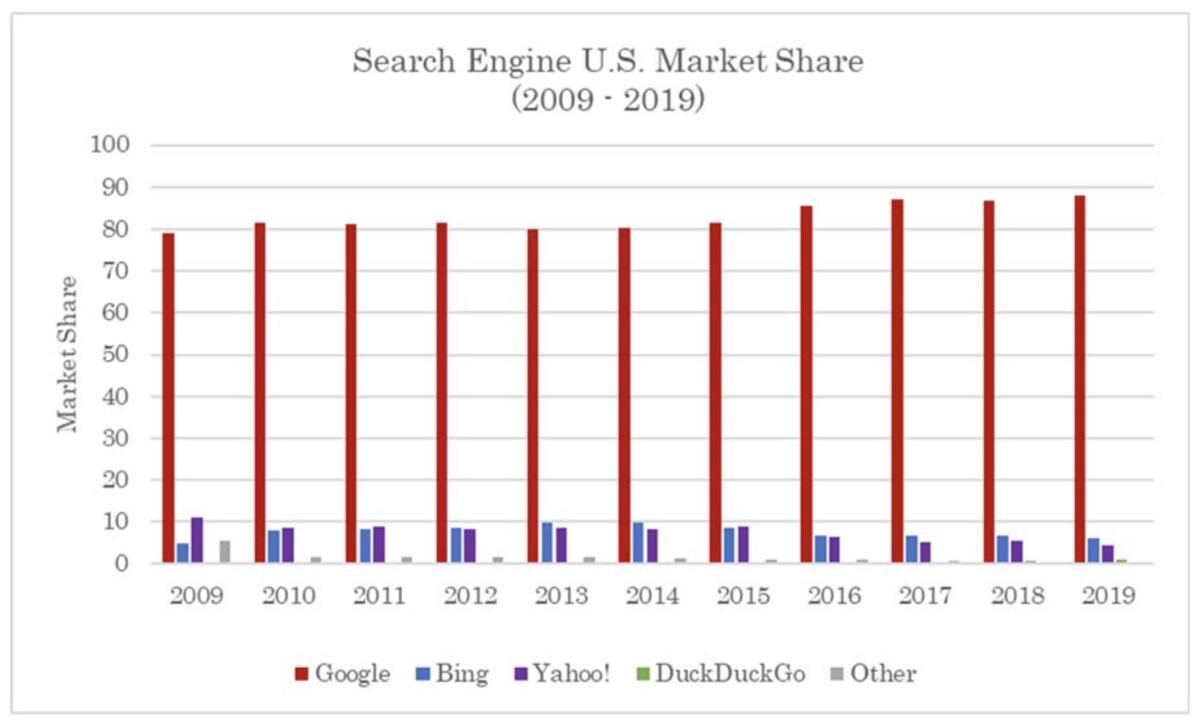Column: An antitrust case against Google is a good thing, but Trump’s involvement is not

Generals and demagogues alike know that the best way to unite people behind you is to identify a common enemy. Such as, for example, Google.
That’s why you’ll see Democratic politicians making nice noises about the Republican Trump administration’s blockbuster antitrust lawsuit against the giant internet company, filed Tuesday in federal court.
Democrats and the administration share a general viewpoint that Google’s ability to throw its weight around is bad for the public interest. Their accord has limits, however — Democrats favor breaking the company up, but that’s not an explicit goal of the lawsuit.
That said, for the moment the stars seem to be aligned. After the Department of Justice filed its case, New York Atty. Gen. Leticia James cited the “good working relationship” she and other Democratic attorneys general have with the DOJ on their “separate but parallel” investigations of Google.
Two things can be true at the same time. Bill Barr is a corrupt Trump crony who should not be the attorney general, and the Justice Department has the power to pursue a legitimate, long-time-coming suit against Google for engaging in anti-competitive, manipulative and often illegal conduct.
— Sen. Elizabeth Warren (D-Mass.)
As much as Google’s other critics might wish to applaud the Trump administration’s aggressive stance against Google, there’s reason to be concerned about the prospect that the lawsuit is clouded by Trump himself.
Trump has waged a long rhetorical campaign against Google and other online companies, accusing them — implausibly — of “censoring” conservative viewpoints.
Atty. Gen. William Barr, in a June 21 interview on Fox News, directly tied accusations of censorship to the administration’s concerns about the “concentration of these very large companies that have that kind of influence on the sharing of information and viewpoints on our society.”
Senior members of the Justice Department have been reported to be upset at the apparent haste to file the Google lawsuit before the election, on the theory that the brandishing of a legal stick against Google might win Trump votes.
Trump’s public determination to punish companies like Google can’t help but undermine the legal rationales embedded in the DOJ complaint, which is said to be the result of more than a year of investigation.
The maker of ‘Fortnite’ may be uniquely positioned to break Apple’s and Google’s mobile app dominance.
Indeed, Public Citizen, a consumer advocacy group that would have been expected to applaud any legal assault on Google’s competitive dominance, branded the lawsuit on Tuesday as “nothing more than a thinly veiled political stunt.”
The group said it feared that the lawsuit’s “narrow focus” would alienate the state attorneys general preparing their own case and charged it was aimed at producing “a choreographed slap on the wrist for Google.”
For her part, however, James said her coalition’s efforts would not be sidelined and further promised to seek to consolidate any lawsuit her camp files against Google with the DOJ’s, and then “litigate the consolidated case cooperatively, much as we did in the Microsoft case.”
In any event, the DOJ lawsuit is certain to remain live through the end of Trump’s term and well into that of either his second term or a Biden presidency.
James’ reference to Microsoft was apt, as the Google lawsuit is the most aggressive attack on an alleged monopolist in consumer technology since the government sued Microsoft in 1998 over its bundling of its Explorer browser with its Windows operating system. The case was settled in 2001.

You’ll even hear stalwart Democrats praising a Trump DOJ initiative, possibly for the first time ever.
Here’s Sen. Elizabeth Warren (D-Mass.) a few days ago, as hints surfaced that the lawsuit was imminent: “Two things can be true at the same time. Bill Barr is a corrupt Trump crony who should not be the attorney general and the Justice Department has the power to pursue a legitimate, long-time-coming suit against Google for engaging in anti-competitive, manipulative and often illegal conduct.” (Note: Emphasis is Warren’s.)
So this is a rare moment, at least for the Trump era, in which the political and policy interest of both parties appear to coincide. Both sides even used the same term to describe Google.
The federal lawsuit calls the company a one-time “ scrappy startup,” adding: “That Google is long gone. The Google of today is a monopoly gatekeeper for the internet, and one of the wealthiest companies on the planet.”
That echoes the words of the Democratic majority on the House Judiciary Committee, which in a blistering report issued Oct. 6 named Google as one of a group of “scrappy, underdog startups that challenged the status quo [yet] have become the kinds of monopolies we last saw in the era of oil barons and railroad tycoons.”
Still, the differences between the approaches of the two camps may be more telling than the similarities. To understand where they diverge, let’s examine the Justice Department’s case.
Spectrum joins other big companies in bailing on promises they have made.
The lawsuit focuses on Google’s apparent death grip over search traffic and its use of that dominant position to exercise control over online advertising. The government complaint asserts that in recent years Google has accounted for nearly 90% of all search queries in the U.S., and 95% of queries on mobile devices such as phones and tablets.
If anything, those figures may understate Google’s influence, the lawsuit states. That’s because search engines rely on user queries to build their effectiveness and reliability, so Google’s enormous footprint effectively keeps would-be rivals from building up their own systems. That produces “continuous and self-reinforcing monopolies in multiple markets,” the Department of Justice says.
Google protects those monopolies by cutting exclusive deals with computer and mobile hardware makers such as Apple, whose operating systems compete with Google’s Android, with hardware makers seeking to license Android for their own products, and with wireless carriers and browser designers.
For years, the DOJ says, Google has contracted with Apple to set its search engine as the default for Apple’s Safari browser, iPhones and iPads. Naturally, its search engine is the default for Android mobile phones, and for Google’s own Chrome browser, the most popular web browser for computer and mobile users.
As everyone in the consumer tech industry knows, inertia is a powerful factor — customers almost never bother to change the default settings that come with their devices. That makes dislodging Google as the search engine of choice a daunting task indeed.
Google has used its dominance in search to acquire a dominant position in search page advertising, the lawsuit asserts. The same phenomenon is at work in advertising as it in search — the larger the footprint, the greater the appeal to customers.
Google’s search ads “have become a ‘must have’ for many advertisers,” the DOJ says. “But users do not benefit” to the same extent. In fact, their privacy may be compromised by Google’s ability to exploit their personal information, including their searches, to feed them ads thought to be personally appealing.
One motivating factor for the government lawsuit is the prospect that Google would expand its dominance into new devices. “Google is now positioning itself to dominate ... the next generation of search platforms,” the lawsuit warns, including “smart speakers, home appliances, and automobiles” — the limitless panoply of internet-of-things devices.
Giant Sutter Health says coronavirus crisis warrants renegotiating antitrust settlement. Don’t believe it
The bottom line, according to the Justice Department, is that “American consumers are forced to accept Google’s policies, privacy practices and use of personal data; and new companies with innovative business models cannot emerge from Google’s long shadow.”
To that point, Google’s diverse critics are in agreement. New York’s James and a coalition of attorneys general from across the country last September announced that their investigation of the company would focus on “whether the company has achieved or maintained its dominance through anticompetitive conduct.”
But they diverge from there. The House Judiciary Committee Democrats trained their fire not on Google alone, but on the big actors in digital markets generally, including Facebook, Amazon and Apple.
They and Sen. Warren sought a much more dramatic antitrust remedy than the Trump administration — breaking up the big companies by unwinding their allegedly anticompetitive acquisitions.
Not a single one of the hundreds of acquisitions staged by Google and the other companies in 2000-19 was blocked by antitrust enforcers, the House Democrats observed.
Warren, in a policy paper issued during her campaign for the Democratic presidential nomination, called for a flat ban on “platform utilities” such as Google owning any participants on that platform. She specifically advocated stripping Google of Waze, a traffic-tracking app; Nest, a maker of internet-enabled thermostats, doorbells and other household devices; and DoubleClick, an online advertising company.
The DOJ lawsuit is much vaguer on that point, seeking “structural relief as needed to cure any anticompetitive harm. The government also asks the court to bar Google from continuing to engage in the anticompetitive practices it outlined.
That leaves plenty of room for almost any settlement the government and company might choose to pursue. Whether the lawsuit’s outcome will be a smaller Google, a chastened Google or a Google operating just as it has in the past will depend on myriad factors, not least the question of which party is in charge come January.









